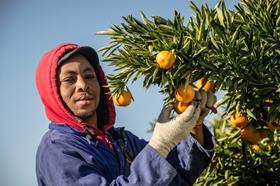
South Africa’s citrus exports to the US have grown dramatically over the past 15 years and are expected to reach a turnover of R720m (US$60m) this year.
In the first year of shipments after South Africa gained entry to the US market (1999), citrus to the value of only US$850,000 (R10.2m) was sent, meaning exports have grown more than 7,000 per cent in the period since.
South African citrus leaders say this remarkable progress has been achieved through industry cooperation and delivering the best quality of product to what is a discerning market. They also point to the fact that South Africa benefitted from concessions under the American Growth and Opportunities Act (AGOA), which provided an enormous boost to the economy of the Cape region, where most of the fruit which is exported to the US market is grown.
“We are therefore very pleased that AGOA has been renewed for another ten years because it increases our profitability and contributes to our development and transformation programmes,” says Suhanra Conradie, chief executive of the Western Cape Citrus Producers’ Forum (WCCPF).
Although not the sole reason for the South African success, the first term of AGOA contributed to the development of a successful South African export programme to the US. During this period South African citrus earned more than US$730m (at today’s exchange rate, R8.8bn) in the US. Around 60 per cent or US$450m (R5.4bn) has been returned to the farm and the economy of the Western Cape.
WCCPF and its producers are firmly committed to developing its presence in the US market. The group focuses on expanding the varieties that find favour with US consumers, while constantly improving the quality of their products.
The WCCPF has furthermore expanded its marketing and distribution infrastructure to reach Mid-West states in the US.
Through their production and marketing expertise, South African growers have carved a significant slice of market share in the US summer citrus market. This has not only enabled them to expand production, but has also supported important transformation goals in the industry. During the past 15 years a number of very successful empowerment projects, initiated by growers, have been introduced. The renewal of AGOA is expected to further support this development.
Conradie says some 4,000 permanent and 12,000 seasonal workers are now benefitting from the citrus export programme to the US, while another 3,000 jobs have been created in the direct and indirect service sectors.
“The ten empowerment initiatives are known as the Harvest of Hope projects, which are broad-based ownership and development initiatives for workers,' she explains. 'They often differ in nature, but all involve either the production of citrus fruit, rooibos tea, wine and table grapes and deciduous fruit, or facilitate worker shareholding in packhouses where the exported fruit is packed.”
According to Conradie the wider benefits include skill development and transfer, education and training, health care, with a particular focus on HIV-AIDS and child care programmes, as well as leisure time and sports development.
“At these projects we have seen the economic empowerment of 1,210 workers, while a further 500 benefit from social development programmes,' she continues. 'Altogether some 4,500 people are reached by them.”
Lena September, of one of the Harvest of Hope projects Cedar Citrus established by ALG Estates, commented on the impact it is having on the community.
“You can see excitement in the people, excitement over opportunities to educate children at a tertiary level, to empower women in the community – this project uplifts the entire community, not only the shareholders,' she says.
Kolie Paulse, previous farmworker of the year, adds: “I look back on a road of development opportunities, such as courses and being part of the senior management team, created for me at Mouton Citrus. This allowed me to grow and I am able to plough this back into my own business and help fellow colleagues.”
The efforts of the Cape citrus growers in the US and in transformation have also been recognised in diplomatic and other circles.
Vangile Titi, Minister Counselor for Agriculture attached to the South African Embassy in Washington, DC in the US notes: “We are known for our generosity of spirit and for negotiating our post-apartheid experiment. I have participated in the opening of a community centre and visited the pre-school setup for farm workers’ children. I think the housing provided for the workers is worth showcasing to the rest of the farming communities in our country.”
Teddy Taylor, the US Consul General in Cape Town, has described the citrus export example as one of the great success stories under AGOA, while Archbishop Desmond Tutu, who is well acquainted with the Harvest of Hope projects, states that 'the ideals of the Rainbow Nation were alive and well in the citrus orchards of Citrusdal, adding that he hoped these efforts will receive more recognition and credit in South Africa.
The WCCPF considers its successful Harvest of Hope projects as true and sustainable empowerment because they significantly improve the position of farm workers and also opens the door for a new generation of land owners and entrepreneurs.
The benefits derived from selling South African citrus in the US reaches far wider than only the farms on which the fruit is produced and grown, sustaining whole rural communities, towns and infrastructure.



